





1410 On May 4 Antipope (since 1409) Alexander V (b. 1339) dies (poisoned?), and on May 17 Cardinal Baldassare Cosa of Naples (a brutal libertine and former pirate who obtains the position through force of arms and who is made a priest one day before his coronation?) is elected antipope #4 of the Great Schism Antipope John XXIII (1370-1419); his bitchin' backer Giovanni di Bicci de' Medici (1360-1429) hits the jackpot, and the Medicis become "God's bankers". On May 18 Rupert III (b. 1352) dies, and Wenceslaus (Wenceslas) (Wenzel) IV (the Drunkard) (the Lazy) of Luxembourg (1361-1419) continues to claim the kingship of Germany, which is contested by his cousin Jobst (Jost) (Jodokus) of Moravia (1351-1411) and his younger brother Sigismund I of Luxemburg (1368-1437), who are both elected. On May 31 Martin I the Elder of Aragon (b. 1356) laughs himself to death, and since he leaves only bastard grandson Count Fadrique of Luna without getting him confirmed as successor, a 2-year interregnum follows. A momentous battle for Eastern Europe? On July 15 a huge Slavic Polish army under king Wladislaw II Jagiello (1351-1434), along with partially-pagan Slavic Lithuanians under grand duke Vytautus (Witowt) the Great (1350-1430), aided by some Tartars defeats and massacres the German Roman Catholic Teutonic Knights at the Battle of Tannenberg (Zalgiris) (Grunwald) and bankrupts them, with the survivors escaping to Marienburg Fortress and holding on; Eastern Europe is saved from Germanization; Samogitia (Zemaitija) ("lowlands") in NW Lithuania becomes the last region in Europe to stay pagan until late in this cent. - and Hollywood casting agents are left to sort it out later? While English king Henry IV is sick, Prince Henry heads the royal council, until he is removed after an argument with his father. On July 16 after supporting them turning on him, Prague archibishop #5 (1403-11) Zbynek Zajic of Hazmburk (Hasenburg) (13671-1411) excommunicates Jan Hus and his followers, and orders their works confiscated and burned at his court, causing Hus to flee a lynch mob, while pro-Hus Prague U. students chant "Illiterate Jajic burns books without knowing what they contain", after which Wenceslaus IV intervenes, ordering him to reverse his edict and replace the burned books, and when Zajic refuses he cuts off his income, then after he still refuses, confiscates all church treasures, after which Wenceslaus IV's brother Sigismund I intervenes and gets them to kiss and make up, after which Zajic gets cold feet and tries to hike to Hungary, falling ill and croaking in Prespurk (Bratislava) next Sept. 28. War breaks out in Holstein, and Eric of Pomerania conquers Als and Aero. The (Kara Koyunlu) (Qara Qoyunlu) (Black Sheep Turks (Turkomans) (1375-1468) under ruler (1388-1420) Abu Nasr Qara Yusuf Nuyan ibn Muhammad begin expanding from the area of Lake Van in E Anatolia (which is so salty that only the darekh herring can survive in it), defeating their former allies the Jalayirids and ending their dynasty, then taking Baghdad, Iran, and Azerbaijan and establishing a dynasty under the Baharlu (Barani) family (until 1467). The old half-forgotten Salic Law, providing for inheritance by daughters in the absence of surviving sons is resurrected by Jean de Montreuil in a treatise against the claims of England's Henry IV to the French throne. Finances are so bad in Portugal that Queen Philippa issues a fiat money in the form of leather tokens as legal tender. Castile captures Antequera from Granada. Good news in the battle against heretics? English Lollard John Budby is burned at the stake. The electorate of Brandenburg, ruled by princes of the houses of Wittelsbach and Luxembourg since 1323 comes up for grabs, and the Palatinate branch of the House of Wittelsbach (founded 1119) begins fracturing into numerous branches, incl. Birkenfeld, Neuberg, Neumarkt, Sulzbach, and Zweibrucken; meanwhile Sigismund of Luxemburg becomes prince-elector of Brandenburg again (until 1415). Inventions: The Astronomical Clock in Prague's Old Town Hall begins tracking the motion of the Sun and Moon. Rudolph of Nuremberg invents wire. Nonfiction: Ptolemy (90-168), Geography; the first trans. appears in Toledo, Spain, reviving the notion that the Earth is spherical - hold onto your hats, cardinals? Art: Guillebert de Mets, Le Roman de Melusine; 16 paintings about the Euro legend of Melusine, a woman who is a fish or serpent from the waist down. Births: French "la contenance angloise" poet Martin le Franc (d. 1461) (b. 1395?) in Normandy; educated at the U. of Paris. German organist (blind) Conrad Paumann (d. 1473) in Nuremberg. Dutch Flemish painter Dieric (Dierik) (Dirk) (Thierry) Bouts (d. 1475) in Haarlem; #2 15th cent. Dutch painter after Jan van Eyck. Scottish nobleman (builder of Rosslyn Chapel) William Sinclair, 1st Earl of Caithness, 3rd Earl of Orkney, Baron of Roslin (d. 1484); son of Henry Sinclair, 2nd earl of Orkney; grandson of Henry Sinclair, 1st earl of Orkney. Deaths: French Hundred Years' War chronicler Jean Froissart of Valenciennes (b. 1337); leaves Froissart's Chronicles. German HRE (1400-10) Rupert III (b. 1352) on May 18 near Oppenheim. Spanish king of Aragon (1396-1410) and Sicily (1409-10) Martin I the Elder (b. 1356) on May 31 in Valdonzella (Barcelona?); dies of indigestion combined with uncontrollable laughter?


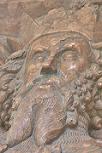

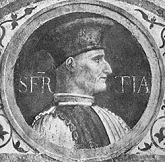



1411 On Feb. 1 after being unable to finish them off, the First Peace of Thorn (Torun) (1466, 1709) is signed between Poland-Lithuania and what's left of the Teutonic Knights, halting the Slavic advance by giving them Samogitia and an indemnity, even though P-L fails to get access to the Baltic. In Mar. a new ban is put on Jan Hus, but he keeps on truckin', preaching the disturbing doctrines of John Wycliffe; meanwhile, Antipope John XXIII tries to finance a war through the wholesale selling of indulgences, and Hus' preaching against it gets the city of Prague declared to be under a special curse from God. On May 19 the Battle of Roccasecc in Lazio, C Italy (birthplace of St. Thomas Aquinas) is a V for the allied army under Muzio Attendolo Sforza (1369-1424) (founder of the Sforza Dynasty) over Ladislaus of Naples, who retreats to a defensive line at San Germano, and signs a peace next June 14, with Antipope John XXIII paying him 75K florins, investing him with the crown of Naples, and names him gonfalonier of the Church; too bad, both renege while jockeying for position. On June 3 Leopold IV (b. 1371) dies without heirs, and his younger brothers divide the inheritance, with Ernest the Iron (1377-1424) receiving Inner Austria incl. Styria, and Frederick IV of the Empty Pockets (1382-1439) receiving Further Austria incl. Tirol; in 1414 Ernest becomes the last duke enthroned according to the traditional Carinthian rite, and the first Hapsburg to call himself archduke (which had been thought up by Rudolf IV); meanwhile Appenzell breaks off from Further Austria and becomes a protectorate of the Swiss Confederacy. On June 5 Ottoman prince Musa, with the help of the Serbs kills Suleiman at Edime, but the Serbs end up backing Musa's brother Mohammad as sultan, and a power struggle ensues. On July 24 a dispute over the earldom of Ross in the Scottish highlands results in the bloody Red Battle of Harlaw between Donald, lord of the Isles and Alexander Stewart, earl of Mar (an unstarved nephew of the duke of Albany); Donald burns Macbeth's old town of Inverness, and it is later rebuilt. After rival king Jobst of Moravia dies, Sigismund I of Luxembourg, son of HRE Charles IV, and brother of deposed HRE Wenceslaus IV is elected German king Sigismund I (1368-1437), with Wenceslaus allowed to keep Bohemia; Sigismund I succeeds the French king as the main protagonist for ending the papal schism, forcing Antipope John XXIII to call the Council of Constance of 1414, with a mission of reforming the Church from head to foot. The Burgundian-Armagnac dispute breaks out into civil war in France. The German nobles retake Flensburg from Eric VII of Denmark. Prince Henry is dismissed from the English Privy Council. Peace between Portugal and Castile ends 26 years of war, but throws the war economy into chaos; the well-read Queen Philippa proposes sending a military expedition to the Muslim kingdom of Fez in order to strike an alliance with Prester John and gain access to the Indian spice trade, and sends spies to North Africa, who discover Timbuktu, the center of importation of Muslim gold. Wallachia becomes a vassal state of the Ottoman Empire. You're a shining star? Ahmad Shah (-1442) becomes Rajput ruler of Gujarat in W India, and builds the capital city of Ahmadabad (Ahmedabad) (modern pop. 1.2M) on the Sabarmati River in Gujarat (290 mi. N of Bombay), complete with the Tin Darwaza (Triple Gateway) and the Indo-Saracenic Great Mosque (Jami Masjid) of Ahmadabad, with 300 elaborately carved pillars, becoming one of India's most magnificent cities. Architecture: London Guildhall (city council hall) in England is begun (finished 1440), becoming the only non-ecclesiastical stone bldg. in London to survive to modern times, becoming the site of the trials of Anne Askew, Lady Jane Grey, Thomas Culpeper, Thomas Cranmer, Roderigo Lopez et al., and the last public appearance of pianist Frederic Chopin on Nov. 16, 1848. Births: Two branches of Edward III converge in one kingmaker? English paper crown king and royal topological branch point Richard Plantagenet, 3rd Duke of York (d. 1460) on Sept. 21; son of Richard of Conisburgh, 3rd earl of Cambridge (1375-1415) (son of Edmund de Langley, 1st duke of York (1341-1402), son of Edward III] and Anne de Mortimer (1390-1411) (daughter of Roger de Mortimer, 4th earl of March (1373-98), (son of Philippa, 5th countess of March and Ulster (1355-82), daughter of Lionel of Antwerp, 1st duke of Clarence (1338-68), son of Edward III); husband of Cecily Neville (1415-95); father of Edward IV (1442-83) and Richard III (1452-85). Spanish poet Juan de Mena (d. 1456) in Cordoba. Islamic Mamluk scholar Abu al-Mahasin Yusuf ibn Taghribirdi (d. 1470) in Egypt. Deaths: Austrian duke Leopold IV (b. 1371) on June 3 in Vienna. Prague archibishop #5 (1403-11) Zbynek Zajic of Hasenburg (b. 1376) on Sept. 28 in Prespurk (Bratislava).
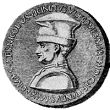



1412 On May 16 strongman Gian Maria Visconti (b. 1388) is assassinated in Milan by Ghibelline partisans, and his cruel ugly brother Filippo Maria Visconti (1392-1447) becomes duke #3 of messed-up Milan (until Aug. 13, 1447), going on to recover his father's Lombard territories incl. Genoa with the help of his condotierri Francesco Bussone, Count of Carmagnola (1382-1432), Niccolo (Niccolò) (1386-1444), and Francesco Sforza (1401-66). On Oct. 28 after both sides in the Flensburg dispute agree to allow Count Ulrich of Mecklenburg to mediate, and he awards the city to Denmark, Queen Margaret (Margreta) I (b. 1353), the "lady king" of Denmark, Norway, and Sweden dies suddenly of plague in Flensburg, and her grandnephew Eric of Pomerania becomes Eric (Erik) VII (1382-1459), sole ruler of those countries (until 1439); meanwhile the fight over Flensburg is back on. The Glyndwr (Glendower) Revolt (begun Sept. 16, 1400) ends with Wales being laid waste and Owen Glendower vanishing after refusing two pardon offers from Henry V; he dies in 1415. The Compromise of Caspe is agreed to, and Martin I's nephew Infante Ferdinand of the Castilian House of Trastamara (regent of Castile since 1406) defeats four rivals to become king Ferdinand I of Antequera "the Just" "the Honest" (1380-1416) of Aragon (until 1416), which incl. Barcelona, Valencia, Cerdanya, Roussilon, Majorca, Sardinia, Corsica, Sicily, and Athens and Neopatria in Greece, reuiniting the house of Aragon with Sicily, which had been separated since 1296; he conquers the Muslim town of Antequera in Granada this year - so all I need now is a bike? Basque whale hunters reach Iceland in their quest for this elusive quarry - call me Ishmael? Emperor (since 1382) Go-Komatsu (b. 1377) abdicates, and his eldest son Shoko (1401-28) becomes Japanese emperor #101 (until Aug. 30, 1428), after which only N court emperors are considered legitimate. Cheng Ho (Zheng He) returns from his 2nd voyage to Ceylon (begun 1408) with the king and royal family in chains, then begins planning his 3rd voyage - rubadubdub, thanks for the grub, yeah God? The Castilian Ghetto Edict makes sure that the perfidious Jewish murderers of Christ among them are thoroughly segregated from the good and innocent Christian sheep. Art: Master of Boucicaut, Portrait of Charles VI the Mad. Donatello (1386-1466), Statues of St. Peter, St. Mark and St. George (1412-6). Births: French holy warrior babe ("the Maid of Orleans") (St.) Joan of Arc (Jeannette or Jehanne d'Arc) (Jeanne Darc) (Joan la Pucelle) (d. 1431) on Jan. 6 in Domremy-la-Pucelle (Champagne). German elector of Saxony (1428-64) Frederick II (the Gentle) (d. 1464) on Aug. 22 in Leipzig; eldest son of Frederick I (1370-1428) and Katharina of Brunswick-Luneburg. Italian anatomist Arculanus (d. 1484). Deaths: Swedish king (1364-89) Albert of Mecklenburg (b. 1338) on Apr. 1 in Mecklenburg. Danish-Norwegian-Swedish queen Margaret of Denmark (b. 1353) in Flensburg (plague). Italian duke of Milan #2 (1402-12) Giovanni Maria Visconti (b. 1388) on May 16 in Milan (assassinated in front of the Church of San Gottaro).




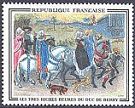
1413 On Feb. 13 the Disputation of Tortosa in Spain opens at the request of Antipope Benedict XIII, pitting Jewish scholars against Christian scholars incl. Joseph Albo (1380-1444) on matters of faith, with the aim of converting the Jews to Christianity by debate - well, later as we are toasting marshmallows we can say we tried? My complaint is I'm so cute but dang have you seen my backstage? On Mar. 20 46-y.-o. English king (since Sept. 30, 1399) Henry IV (b. 1367) dies at Westminster Abbey, and on Mar. 21 his 25-y.-o. son Prince Hal the Lancastrian is crowned Henry V (1386-1422) ("King Harry") of England (the 34th British monarch) (until Aug. 31, 1422); he is crowned on Apr. 9; under his rule England finally becomes a major power, and his court becomes the first to use mainly English; he releases Edmund de Mortimer, 5th earl of March, restores the titles and land of the Percy family, and honorably reburies the 13-y.-o. remains of Richard II; he restrains the use of armorial insignia by knights (until 1483); the Chancery Standard is developed during his reign for his chancery officials to use by the 1430s to replace French. Vive la France? On Apr. 27 Paris is taken over by the butchers' guild, led by skinner Simon Caboche (Lecoustellier), who on May 26 imposes the Ordonnance Cabochienne; the Armagnacs soon regain control and quash all hope for reform. In mid-May Ladislaus of Naples marches N, occupying and sacking Rome on June 8, then marching N to Umbria and N Latium, causing Florence to fold and sign a treaty recognizing his conquest of the papal states; too bad, in July 1414 Ladislaus falls ill, and is forced to return to Naples, dying on Aug. 6, on the 2nd anniv. of his mother's death. On Sept. 23 knight, boon companion to Henry V, and leading Lollard Sir John Oldcastle, Lord Cobham (1378-1417) (the real Falstaff?) is arrested and brought before Lollard-hating Thomas Arundel (1353-1414), archbishop of Canterbury (since 1399) on charges of heresy, and excommunicated; he escapes and goes into hiding in Wales, where he leads a Lollard Uprising. John the Fearless, duke of Burgundy is forced to flee Paris, allowing the Armagnacs to come into power in France. A revolt by Count James II of Urgell against Ferdinand I of Aragon (one of the candidates beat-out for the king job in 1412) is quashed, and the county of Urgell (founded 798) is absorbed by the county of Barcelona. Beyazid I's son Mehmed (Mehmet) I (the Restorer) (Celebi) (1389-1421) defeats and kills his brother Musa outside Constantinople, and emerges as Ottoman sultan #5 (until 1421), setting about restoring Ottoman strength after the Tamerlane era. Thomas a Kempis (1380-1471) is ordained a priest, going on to join the Brethren of the Common Life, a movement stressing the leading of a devout life. Art: Herman Limbourg, Jean Limbourg, and Pol Limbourg, Les Tres Riches Heures du Duc de Berry (The Three Rich Hours of the Duke of Berry) (1413-16); illuminated ms. showing daily life by the Flemish Limbourg brothers, who work in France for insatiable art collector the Duke of Berry from 1380-1416. Births: German Hohenzollern prince-elector #2 of Brandenburg (1440-70) Frederick II "Irontooth" "the Iron" (d. 1471) on Nov. 19 in Tangermunde; son of Frederick I (1371-1440); brother of Albert II Achilles (1414-86). Deaths: Anatolian poet Tajuddin Ibrahim Ahmedi (b. 1334); leaves Iskendername ("Alexander Narrative"), a verse life of Alexander the Great dedicated to Bayezid's son Suleyman. English king Henry IV (b. 1367) on Mar. 20 in Westminster Abbey. Ethiopian king (since 1382) Dawit I.
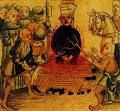
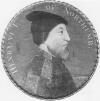



1414 On Mar. 13 Henry Chicheley (Chichele) (1363-1443) is recommended to the pope by Henry V for appointment as archbishop of Canterbury, and he receives the pall without going to Rome on July 24. On Apr. 30 the Leicester Parliament in England meets, passing a law making all Lollards into felons with orders to all justices of the peace to hunt them down and destroy their estates; William Shakespeare's Henry IV Act 1 Scene 2 claims that Henry Chicheley tempts Henry V into conquering France to divert Parliament from disendowing the Church, although it did the opposite and he never attended a session. In Oct. Jan Hus (b. 1369) is lured to his death by Antipope John XXIII to the keep-constant Council of Constance (1414-18), ostensibly to settle "causa unionis, reformationis, fidei", but in fact to try and condemn him for heresy after nearly killing him in a stinking dungeon; the council prohibits the cup to the laity during Communion, and confirms the Conciliar Theory that the authority of a gen. church council is superior to the popes, deposing all three current popes and electing a new one, which ups Sigismund I's capital and makes him the most influential monarch in W Europe; former pirate John XXIII is charged with 70 offenses, incl. piracy, murder, rape, sodomy, and incest, after which 16 "of the most indescribable depravity" are dropped in the interest of public decency?; meanwhile proposals to reform and reorganize the corruption and abuses of the rest of the hierarchy are debated, but never attain majority support, although the need for reform is universally recognized. On Nov. 12 the Disputation of Tortosa ends with no Jewish minds changed, causing the Roman Catholic Church to intensify forceful means of conversion of these stiff-necks to save their souls. After a plot against his life is discovered, Henry V attacks and captures a Lollard group, and has most of them hanged, pushing through anti-Lollard legislation allowing seizure of their books. A peace is declared between the Burgundians and Armagnacs in France, and Henry V takes advantage of the situation to ally himself with Burgundy. Henry Percy (d. 1455), 2nd earl of Northumberland (1393-1455) (son of Hotspur) has his honors and estates restored by Henry V. Joan of Brittany is arrested by her stepson John of Lancaster, 1st Duke of Bedford (1389-1435) (AKA John Plantagenet) (3rd son of Henry IV, brother of Henry V, and uncle of Henry VI), and imprisoned. Ferdinand I of Aragon creates the title of prince of Gerona for the heir to the crown of Aragon. Cologne spews its Jews. Sultan Mahmud Tughlak II dies, ending the Tughlak Dynasty in Delhi (begun 1315), and the Sayyid Dynasty begins in N India (until 1451), reduced to the Jumna Valley with iffy control over the Punjab; the Sayyids claim Arab descent from Prophet Muhammad, but nobody buys it and they can collect their revenues only at swordpoint? Sultan Mehmed I defeats a Karamanid army and recaptures Izmir and other territories from the Karamans, and restores Adrianople's power over the emirs of Anatolia (1414-15). Cheng Ho launches his Third Voyage from China to the Straits of Hormuz in a giant fleet carrying 30K slant-eyed men. The Medicis of Florence become bankers to the papacy (until 1476) - the original credit card trap? The Venetian Memorandum of the power and revenues of the states of Europe is pub. - you won't have to give up your doctor? Coffee is being drunk in Mecca; it later becomes known as a Sufi drink. Architecture: Sultan Mehmed I begins the Green Mosque (Yesil Camii) in Bursa (finished 1424). Births: Italian pope (1471-84) (founder of the Sistine Chapel) Sixtus IV (d. 1484) on July 21 near Savona, Liguria; joins the Franciscan Order, rising to minister gen. in 1464 and cardinal in 1467. German Hohenzolleran prince-elector #3 of Brandenburg (1470-86) Albert (Albrecht) II Achilles (d. 1486) on Nov. 9 in Tangermunde; son of Frederick I (1371-1440); brother of Frederick II (1413-71); father of John II Cicero (1455-99), Frederick I (1460-1536), and Siegmund (1468-95). Gujarat poet-saint Narsi (Narsinh) Mehta (d. 1481) (1409-88?) in Talaja, Gujarat - get his CDs? Persian poet Jami (d. 1492); last great classic poet of Persia? Deaths: English archbishop of Canterbury (1397, 1399-1414) Thomas Arundel (b. 1353) on Feb. 19. Hungarian-Croatian king (1390-1414) and Naples king (1386-1414) Ladislaus the Magnanimous of Naples (b. 1377) on Aug. 6 in Naples (STD?).








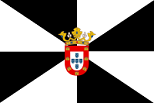

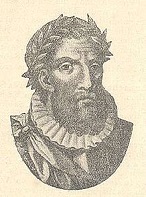

1415 The first documented cases of influenza (flu) appear in Paris - just in time to toughen up the French and allow them to give it to the defenseless Amerindians? On May 29 insufficiently anti-Jewish Antipope (since 1410) John XXIII (b. 1370) is forced to abdicate in favor of Antipope (since 1394) Benedict XIII, who on May 11 issues the bull Etsi Doctoribus Gentium against the Jews, banning the study of the Talmud, instituting forced Christian sermons, and restricting Jewish life completely, provoking mass feigned conversions; meanwhile in 1410-13 St. Andrews U., Scotland's first univ. is founded by Avignon Antipope Benedict XIII for Augstinian clergy. On July 4 Roman Pope (since 1406) Gregory XII (b. 1327) dies in Recanati in C Italy. Don't muss with us Huss? On July 6 Jan Hus (b. 1369) of Bohemia is burned at the stake in Constance (Konstanz) for heresy after HRE Sigismund I of Luxembourg (1368-1437), who had guaranteed him safe conduct signs his death sentence, earning the everlasting hatred of the Bohemians, and making it impossible to rule Bohemia when he takes it over in 1419, spawning the radical communistic anti-scholastic Taborites centered in gold mine-rich Tabor, and the less radical Ultraquists (Lat. "sub utraque specie" = in both kinds), who believe that both the wafer and the cup should be administered during the Eucharist; Sigismund I bans Duke Frederick IV of Austria for siding with Antipope John XXIII at the Council of Constance, causing him to lose the Aargau (old homeland of the Hapsburgs) to the Swiss, although with popular support he keeps Tirol, which he stabilizes by beginning silver mining, moving his court from Merano to Innsbruck. On July 19 (July 9 Old Style) Queen Philippa of Lancaster (b. 1360) dies of plague after making her children promise her on her deathbed to gain access to the Indies), and on July 25 (July 15 Old Style) a fleet of 200 Portuguese vessels carrying 45K men sails for Africa, led by her hubby John I and their sons Prince Duarte, Prince Pedro, and Infant Henrique, AKA Prince Henry the Navigator (1394-1460) (who is wounded), which on Sept. 1 (Aug. 22 Old Style) after an early a.m. surprise attack and only two days of fighting captures the African port of Ceuta (Sabtah) (Seba) off the N coast of Morocco (the Maghrib) from the Moors, becvoming the first European foothold in Africa, giving John I the new title of Lord of Ceuta while spurring a rising of Sufi sheiks in reaction to lead the defense against the *!?*! infidels; a flag of Lisbon with the Portuguese coat of arms added to the center; John I's eldest son Duarte (Edward) I is knighted; the Portuguese retain control until it decides to be controlled by Spain in 1640; Alvaro (Álvaro) Vaz de Almada, 1st Count of Avranches (1390-1449) hoists the new Flag of Ceuta, a flag of Lisbon with the Portuguese coat of arms added to the center; the Portuguese retain control until it decides to be controlled by Spain in 1640; John I's eldest son Duarte (Edward) is knighted; Almada is knighted for his services by Duke Peter of Coimbra, and June 1423 John I appoints him adm. of the sail fleet, outranking the adm. of the galley fleet, after which he is created 1st count of Avranches on Aug. 8, 1444 by Henry VI of England; Moorish POWs soon reveal that they trade salt for gold from Saharan traders, whetting their appetites to become a player - and they owe it all to a woman? On Aug. 11 English king (since Mar. 21, 1413) Henry V of England (1386-1422), with the tacit approval of John the Fearless of Burgundy, and hoping to take advantage of French anarchy reasserts his claims to the French throne, sails from Portsmouth with 10K men, and lays seige to Harfleur, rekindling the Hundred Years War (1337-1453); his brother John of Lancaster, 1st Duke of Bedford (1389-1435) is made lt. of England during his absence; after going up the coast of Normandy (Fecamp, Arques), Henry V goes E into Picardy to Amiens and Peronne, then swings N into Artois, heading for Calais; on Oct. 25 (St. Crispin's Feast Day) (Fri.) with the help of his 6K longbowmen Henry V and his "band of brothers" (Shakespeare) repeats the lesson of Crecy (1346) and wins big against the 30K-man French army hampered by their clunky knights (easy archery targets?) under Charles of Valois, Duke of Orleans (Orléans) (1394-1465) (future mad king Charles VI) and Charles d'Albret (-1415) (constable of France since 1413) at the 4-hour Battle of Agincourt near Arras in Flanders 50 mi. S of Calais (in an area with heavy clay-laced mud), destroying the flower of French knighthood (7K French vs. 100 English KIA?); immortalized in Shakespeare's Henry the V; Duke Charles of Orleans is captured after being discovered under a pile of corpses, incapacitated by his own heavy armor, and is taken to England where he is moved from castle to castle for 24 years with ransom prohibited by Henry V, passing his time by writing hunting and poetry in the ballade and rondeau forms in both French and English incl. Is she not passing fair? (later set to music by Edward Elgar) and "En la foret de longue attente", resulting in 2 vols. of poetry after his 1440 release; the actual battle figures were way more even than the English later claimed?; Charles VII's favorite Georges de la Tremoille (Trémoille) (1382-1446) is captured then soon released, going on to become a main opponent of Joan of Arc and become a royal favorite and grand chamberlain in 1427; the English reconquer Normandy (until 1449), undoing the work of Philip Augustus; Henry V is welcomed at Blackheath; Armagnac leader (constable of France) Bernard VII, Count of Armagnac (1360-1418) becomes virtual ruler of France. German king Sigismund I goes to Perpignan to try to induce Pope Benedict XIII to renounce his claims, and after being paid a king's ransom in gold to become one of the seven electors of the HRE, places the electorate of Brandenburg (capital Berlin) under the rule of Burgrave Frederick VI of Nuremberg, who becomes Frederick I (1371-1440), first prince-elector of Brandenburg (son of Burgrave Frederick V of Nuremberg), becoming the first member of the House of Hohenzollern (not to be confused with the kaput stuffy Hohenstaufens of 1138-1268) to rule the Margraviate of Brandenburg (until 1918); Frederick I begins the task of quelling the turbulent nobles and centralizing the govt., while extending the boundaries; too bad, the ambition of the New Kid on the Block Hohenzollerns puts them on a collision course with the Hapsburgs, which results in a final V in 1871 at the expense of the elimination of Prussia as an independent state. Welsh rebel Owen Glendower is defeated by the English after 16 years of rebellion, but he refuses amnesty, remaining in exile for the rest of his life (dies 1416). Richard, earl of Cambridge (grandson of Edward III through his 5th son Edmund, duke of York) is executed by Henry V for plotting to put Edmund Mortimer, umpteenth earl of March on the throne. The First Ottoman-Venice War begins after Muslim pirates raid the Aegean islands (ends 1416); the Ottomans recapture Kroya and Avlona (modern-day Vlorë) in Albania (1415-17). Aargau NW of Lake Lucerne joins the Swiss Confederation. About this year the Muslim Adal Sultanate (Kingdom of Adal) E of Aksum in the N Horn of Africa (Somalia) is founded by descendants of Abdal of Yemen, with capital moved to in Dakkar in 1433 and Harar in 1520, going on to control large parts of modern-day Somalia, Ethiopia, Djibouti, and Eritrea while giving Christian Ethiopia hell. Italian humanistic scholar Giovanni Francesco Poggio Bracciolini (1380-1459), a papal secy. at Rome from 1403-53 begins digging up lost Latin mss. in various monasteries in France, Switzerland, and Germany (until 1417). Architecture: The 60-ton Beijing Bell is erected in Beijing, China, becoming its most famous. Nonfiction: Anon., Ars Moriendi (The Art of Dying); guidance for clergymen and the dying in their final moments, listing rules for a good (righteous) death incl. repentance of sins, forgiveness of enemies, and acceptance of one's fate. Births: English breed mare ("the Rose of Raby") ("proud Cis") Cecily (Cecylle) Neville, Duchess of York (d. 1495) on May 3 in Raby Castle, Durham; daughter of Ralph Neville, 4th Duke of Neville (1364-1425) and Joan Beaufort, countess of Westmorland (1379-1440), illegitimate daughter of John of Gaunt; wife of Richard Plantagent, 3rd Duke of York (1411-60), with whom she has four sons, incl. Edward IV (1442-83) and Richard III (1452-85). Austrian "AEIOU" Hapsburg archduke, German king (1440-86), and HRE (1452-93) Frederick III (the Peaceful) of Hapsburg (Frederick V of Austria) (Friedrich IV of Germany) (d. 1493) on Sept. 21 in Innsbruck; son of Ernest the Iron of Hapsburg, duke of Styria and Carinthia (1377-1424); brother of archduke Albert VI the Prodigal (1418-63). Flemish painter (in Leuven, 1457-75) Dieric Bouts (d. 1475) in Haarlem; student of Rogier van der Weyden; pioneer of a single vanishing point. Scottish politician James Hamilton, 1st Lord Hamilton, 6th Laird of Cadzow (d. 1479) in Cadzow Castle, south Lanarkshire; son of James Hamilton, 5th Laird of Cadzow and Lord Douglas of Dalkeith; husband of Lady Euphemia Graham, widow of the 5th Earl Douglas; stepfather in law of the 8th Earl Douglas. Greek Byzantine scholar-philosopher John Argyropoulos (d. 1487) in Constantinople; reviver of Greek classical learning and study of Plato in the West (Italy); teacher of Johannes Reuchlin, Guillaume Bude, and Lefevre d'Etaples. English "Brut Chronicles: printer #1 William Caxton (Causton) (d. 1492) (b. 1422?). English noble breed mare Jacquetta of Luxembourg, Duchess of Bedford, Countess Rivers (d. 1472); elder daughter of Peter I, count of Brienne (1390-1433), and Margaret de Baux (Margherita del Balzo of Andria) (1394-1469); mother of Elizabeth Woodville (1437-92), wife of Edward IV. Portuguese explorer Afonso Goncalves Baldaia (d. 1481) in Porto. Deaths: Greek Byzantine statesman Manuel Chrysolorus (b. 1350). Portuguese queen (1387-1415) Philippa of Lancaster (b. 1360) on July 19 Sacavem (plague). Czech religious reformer Jan Huss (b. 1369) on July 6 in Constance (burned at the stake); last words: "In 100 years God will raise up a man whose calls for reform cannot be suppressed"; in 1999 Pope John Paul II expresses "deep regret for the cruel death inflicted" on him, and suggests an inquiry to explore clearing him of heresy: "One pays for confession, for Mass, for the sacrament, for indulgences, for churching a woman, for a blessing, for burials, for funeral services and prayers. The very last penny which an old woman has hidden in her bundle for fear of thieves or robbery will not be spared by the villainous priest."
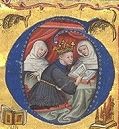

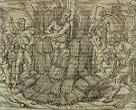
1416 On Apr. 2 Ferdinand I the Just (b. 1380) dies after he justly gets the Council of Counstance to depose antipope Benedict XVIII for refusing to negotiate an end to the 40-y.-o. Great Schism as promised then refusing to abdicate; his son Alfonso V the Magnanimous (1396-1458) (a knight of the Order of the Dragon) becomes king of Aragon, Majorca, Sardinia, and Corsica, and count of Barcelona (until 1458), going on to become one of the key players in the early Renaissance. On May 29 the first war between Venice and the Ottoman empire is won by Doge Pietro Loredano, who defeats the Turks in the Dardanelles at the Mel Gibsonless Battle of Gallipoli and forces a peace treaty in 1419, recognizing Ottoman and Venetian interests in Albania; he helps set the new fashion of the Venetian Portait, a three-quarter view with the gaze displaced, beating them stupid antique profile-only coins - the 15th cent. is where it's at? On May 30 HRE Sigismund I lets Jan Hus follower Jerome of Prague (b. 1379) follow him to the flames for heresy, and allies with Henry V of England; an English fleet commanded by John of Lanaster defeats the French at the mouth of the Seine River. Valais in the Rhone Valley E of Geneva joins the Swiss Confederation. Charismatic preacher-theologian Sheik Bedreddin (1359-1420) leads a revolt against the Ottomans in Anatalia and the European provinces, and is killed after a major military effort. False Mustafa (d. 1422), who claims to be a son of Bayezid I leads another rising against the Ottoman sultan in Byzantium and Walachia, but his forces are defeated and he flees to the Byzantine emperor. A new mediation attempt over Flensburg is made by the Hanseatic Lague, and Denmark pledges the city of Schleswig as security, while the Holsteiners pledge the stronghold of Tonning; too bad, the agreement soon breaks down. Cheng Ho's Chinese fleet reaches Aden. Amadeus VIII gets Savoy elevated into a duchy by HRE Sigismund I. Dutch fishermen are the first to use drift nets. The first law regulating barbers in the practice of surgery is enacted in London - what I want to know is if they could get away with wiping their blades in their buns? After overthrowing the aristocrats and setting up a govt. of the burghers and craftsmen, brewer Johannes Lupi organizes the first brewers' guild in the Baltic Sea port of Danzig, Germany (modern-day Gdansk, Poland), which goes on to become known for the great number and wealth of its members, and their military prowess. The Shoton (Yogurt Feast) in Tibet is first held. Drepung Gomang Monastic U. in Tibet is founded. The complete text of the lost work on rhetoric by Quintilian (35-95), Institutio Oratoria is discovered by Poggio Bracciolini at the St. Gall Monastery - a giant blow for or against democracy? Births: Danish king (1440-8) and Swedish king (1441-8) and Norwegian king (1442-8) Christopher III of Bavaria (d. 1448) on Feb. 26 in Neumarkt in der Oberpfalz; son of Duke John of Pfalz-Neumarkt and Catherine Vratislava (sister of Eric of Pomerania); husband of Dorothea of Brandenburg (1430-95). Italian monk (founder of the Order of Minims) (St.) Francis of Paola (Paula) "the Fire Handler" (d. 1507) on Mar. 27 in Paola. French painter Jean Fouquet (Foucquet) (d. 1480) in Tours; court painter to Charles VII and Louis XI; founder of the French school of painting? - sounds like? Deaths: French royal Duke Jean of Berry (b. 1340) on June 15 in Paris; leaves a huge art collection which is sold to replenish the royal treasury and pay combatants of the 1415 Battle of Agincourt. Welsh rebel Owen Glendower (b. 1359). Spanish king Ferdinand I the Just (b. 1380) on Apr. 2 in Igualada, Catalonia.




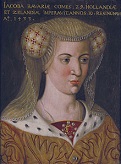
1417 On May 31 Duke William II of Bavaria (b. 1365) dies, and his daughter (by Margaret of Burgundy) Jacqueline of Bavaria-Straubing (1401-36) is passed over for succession to his counties of Hainaut and Zeeland in favor of her uncle (youngest son of Duke Albert I and brother-in-law of John the Fearless of Burgundy) John III (the Pitiless) of Bavaria-Straubing (1374-1425) (first bishop of Liege since 1389, known for hanging rebels from the trees in great numbers), pissing her off and causing her to begin a struggle to get what's coming to her; meanwhile John of Bavaria goes on to hire painter Jan van Eyck (1385-1441), who comes to his court in The Hague in 1422, after which John the Good of Burgundy lures him away. On July 23 Henry V leads an army to the Continent and marches across Normandy in a 3-year victory tour, capturing Caen. Abraham and Martin and John, Medieval Edition? On July 26 the Council of Constance deposes antipope (since 1394) Benedict XIII, ending the Great Schism of the West (begun in 1378); on Nov. 11 Oddone (Ottone) Colonna (Eau de Cologne?) (born in Genazzano near Rome) is elected Pope (#205) Martin V (1368-1431); rockhard lunatic Benedict XIII returns to his rockhard fortress near Valencia, Spain, and holds out as a pretender pope until his death in 1423. I'm your Venus, I'm your Fire of Jordan? On Dec. 14 Sir John Oldcastle (b. 1378), leader of the Lollard religious sect is hanged and burned (alive?) for heresy along with 36 companions; the persecution of Lollards heats up for the next 10 years, driving them underground until the time of Martin Luther. Prince Mircea I the Elder of Wallachia acknowledges Turkish suzerainty in return for a yearly tribute of 3K gold pieces to keep the Ottoman Muslims away. Future Charles VII of France (b. 1403) becomes dauphin of France after the last of his four elder brothers dies: Charles (1386), Charles (1392-1401), Louis (1397-1415), John (1398-1417). Numerous bands of gypsies enter France from NE Europe, and spread into Spain - Sonny and Cher jokes here? Inventions: Printers in Antwerp use movable type. Science: The long-lost full text of Lucretius' De Rerum Natura (60 B.C.E.) is rediscovered in St. Gall Monastery by Italian humanist Gian Francesco Poggio Bracciolini (1380-1459), along with seven orations of Marcus Tullius Cicero, a commentary of Quintus Asconius Pedianus on five speeches of Cicero, and the history of Ammianus Marcellinus. Births: Bavarian duke (1450-79) Ludwig (Louis) IX (the Rich) of Bavaria-Landshut (d. 1479)Sigismondo Pandolfo Malatesta (the Wolf) (d. 1468) on June 19 in Brescia; bastard son of Pandolfo III Malatesta and Antonia Barignani; defeats his rivals for Rimini at age 15. Swiss mystic (St.) Niklaus von Flue (d. 1487) in Unterwalden; feast day: Mar. 21/Sept. 25. Deaths: English nobleman Richard de Vere, earl of Oxford (b. 1385) on Feb. 15. Christian mystic Julian(a) of Norwich (b. 1342); leaves Sixteen Revelations of Divine Love - I got you babe?
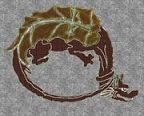



1418 On Jan. 31 prince (since 1386) Mircea cel Batran (Mircea I the Elder) of Wallachia (b. 1355) dies, leaving illegitimate son Vlad III, father of Vlad IV the Impaler hanging around In May Duke John the Fearless of Burgundy returns to Paris, seizes the king, massacres the Armagnacs, and kills Bernard VII, causing dauphin Charles to flee to S France - it was a very good year? In Nov. Henry V begins sieging Rouen (ends Jan.); Sir Thomas Malory (1405-71) fights for Henry V in his conquest of Normandy. The Lam Son Insurrection against the Ming Dynasty begins. The Portuguese, led by Prince Henry the Navigator explore the Madeira Islands this year and next, becoming Henry's first discovery. Mircea the Elder dies, and his son Michael (Mihael I) (-1420) becomes prince of Wallachia (until 1420). Poggio Bracciolini visits England (until 1423). T'aejong dies, and Sejong the Great (1418-50) becomes Yi king of Korea, becoming their most enlightened king. Rich landlord Le Loi (1385-1433) leads Vietnamese forces against the invading Chinese, and defeats them in 1428, becoming emperor of Vietnam in 1428 (until 1433). James I of Scotland sends some of his Scots Guard to Charles VII of France, who settle there and become the Garde Ecossaise (Écossaise) (Fr. "Scottish Guard"), the personal bodyguard of the French kings (until 1830) - the original Beam Me Up Scotty? The Jews are expelled from Trier. Ashikaga shogun Yoshimitsu takes up Japanese noo drama. 10-y.-o. Rene I of Anjou (1409-80) succeeds Nicolas Flamel as grandmaster of the Priory of Sion (until 1480), with his uncle Cardinal Louis of Bar as regent :). Architecture: Gowharshad Agha orders the construction of Gowharshad Mosque in Mashad. Inventions: Helgen become the first pictorial block prints in Europe. Nonfiction: Anon., The Great Book of Lecan; written in Ireland. Nonfiction: Thomas a Kempis (1380-1471), Imitatio Christi (The Imitation of Christ) (1418-27); a self-abusefest for monks who think that the Passion is a Cureall for Booty Night?; biggest bestseller since the Bible. Births: Cyprus king (1432-58) John II/III (d. 1458) on May 16 in Nicosia; last of the line of Raymond of Antioch (1115-49); husband (1435-) of Aimee (Amadea) Palaeologus of Montferrat (1429-40) and (1441-) Helena Palaeologus (1428-58) (daughter of Theodore II Palaeologus). Austrian archduke Albert VI (the Prodigal) (d. 1463) on Dec. 12 in Vienna; son of Duke Ernest the Iron (1377-1424); brother of HRE Frederick III (1415-93). English composer-organist Henry Abyngdon (Habyngton) (d. 1497); first to receive an English musical degree (B. Music from Cambridge). Deaths: French alchemist Nicolas Flamel (b. 1330). Wallachian prince (1386-1418) Mircea I (b. ?) on Jan. 31.

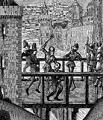




1419 On Jan. 19 after Duke John the Fearless of Burgundy does nothing to prevent it, Henry V of England finishes the capture of Rouen, completing his conquest of all of Normandy except Mount St. Michel by July, opening the way to Paris (which is occupied by Duke John's troops); Norman French who fought against Henry V are severely punished, incl. Alain Blanchard, who hung English POWs from the walls and is summarily executed, and Robert de Livet, canon of Rouen, who excommunicated Henry V and is imprisoned in England for five years; the English occupy Dieppe 33 mi. N of Rouen (until 1435); Henry accuses his stepmother of witchcraft, claiming she caused his father's death, then seizes her money - of course? On July 11 Dauphin Charles parleys with Duke John the Fearless of Burgundy (b. 1371) on the Bridge of Pouilly (Pouilly-le-Fort) near Melun, swearing peace and agreeing to a 2nd parley, which takes place on Sept. 10 on the bridge in Montereau, and ends up as a mortal ambush of the duke. On Aug. 16 Bohemian king (since Nov. 29, 1378) and HRE (1376-1400) Wenceslaus IV the Drunkard (Lazy) (b. 1361) dies, leaving Bohemia in a deep crisis caused by the betrayal of Jan Hus, and guess-who HRE Sigismund I of Luxembourg (1368-1437) succeeds to the throne of Bohemia, being immediately challenged by the growing pissed-off Hussite movement incl. most of the Czech pop. in the Kingdom of Bohemia, whose members hate his huts for what he did to Jan Hus, and on July 30 start the Hussite (Bohemian) Wars (end Jan. 15, 1437), with most of the Czech pop. of the kingdom of Bohemia taking on the Roman Catholic Church and its crusaders, plunging the country into almost 20 years of extreme violence, with hand-held firearms extensively used; Tyn Church (Church of Our Lady Before Tyn) in Prague becomes the Hussite command center; the Hussite Wars hasten the Reformation in Bohemia, while surging Bohemian nationality causes the Bohunks to block any hope of German unification and break off from Germany permanently; meanwhile Sigismund I has trouble getting crowned HRE in Rome, taking until May 31, 1433. In Aug. Henry V reaches the walls of Paris. On Sept. 10 Duke John, who had been wavering in his support of Henry V after seeing him take Rouen and began negotiating with the Armagnacs is assassinated by Dauphin Charles' men during his parley with him at the Bridge of Montereau outside the dauphin's castle, and his son Philip III the Good (1396-1467) succeeds him as duke of Burgundy (until 1467), immediately throwing himself into Henry V's arms at Arras in order to take revenge, and developing a lifelong phobia for bridges; the French court does ditto, entering in a 6-mo. negotiation. Juan II reaches his majority and takes over rule of Castile and Leon. The Madeira (Port. "timber") Islands 250 mi. N of the Canary Islands in SW Portugal are claimed by sailors in the service of Prince Henry the Navigator, becoming the first territorial discovery of the Age of Discovery. Henry V of England imposes rigid legal regulations covering the use of coats of arms to stop court battles, forbidding them unless by right of ancestry or gift from the crown. Architecture: The Doge's Palace in Venice receives a new facade. Florentine architect Filippo Brunelleschi (1377-1446) receives his first commission to build Ospedale degli Innocenti (Hospital of the Innocents) foundling hospital in Florence. Births: Japanese emperor #102 (1428-64) Go-Hanazono (Hikohito) (d. 1471) on July 10; eldest son of prince Fushimo-no-miya Sadafusa (1372-1456) and Sachiko (1390-1448). Dutch reformer-scholar Johann Harmensz Wessel Gansfort (Goesport) (d. 1489) in Groningen; predecessor of Luther. Deaths: Spanish missionary St. Vincent Ferrer (b. 1350) on Apr. 5 in Vannes, Brittany. Korean Chosun Dynasty king #2 (1398-1400) Jeongjong (b. 1357) on Oct. 15. Bohemian king (since 1378), German king (1376-1400) and HRE (1378-1400) Wenceslaus IV the Drunkard (b. 1361) on Aug. 16 in Kunratice (near Prague); dies of a heart attack while hunting. French duke of Burgundy (1404-19) John II the Fearless (b. 1371) on Sept. 10 in Montereau (assassinated).